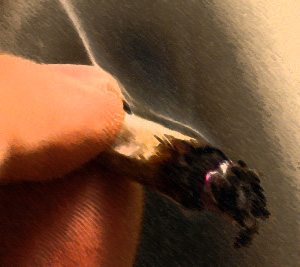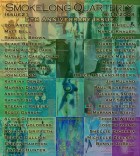It seems to me funerals are so much about history, the history that family and friends have with the deceased, that they have with each other, and all this on display, brought out of the woodwork. And this is certainly true of your fantastic story, “Double-Exposure.” There are so many rich layers of history here. Yet, one of my favorite things about the story is how skillfully you leave the details of those histories out, rather suggesting, suggesting. Is your process more of a taking out or an adding to? Do you subscribe to Hemingway’s iceberg theory? Do we feel more when we know a little less?
I do believe that the absence of information is important in fiction. It allows room for the reader’s imagination. These absences or gaps allow the reader to fill in details from personal experience. Being allowed the room to do this, make the story personal, is part of what makes the story emotional. Drawing an emotional reaction from the reader is the writer’s obligation. Otherwise, what one might think of a story is just a coincidence of words. You could say a writer must be willing to push the iceberg.
Knowing what to leave out of a story is difficult. I take out and add as I revise. I always try to look at the story more than one way. Adding something always leads to removing other things. The same goes for cutting over-written passages.
I also believe the opposite is true. There are times in writing when the best way to communicate something is to just write it point blank. This only works and works best when the story has reached a climatic turning point and emotions are high between characters. I limit it to no more than one short sentence, usually dialog. If the story contains a series of turning points that build on each previous point (and the story should do this), the “one short sentence” has to build and change accordingly. If the sentence disappears or doesn’t grow with the circumstances, the story falls flat emotionally.
In the end, it’s a balancing act. Everything has to be there, and the trick is knowing what to write and what not to write.
As readers probably know, half of the stories in current issue of SmokeLong belong to past staff and guest editors. How many years have you been on staff, Tommy? What did you, as an editor, look for in stories you selected for SmokeLong? What about your own story “Double-Exposure” fits these criteria?
The staff was reading for Issue #2 when I joined. I don’t remember the exact date, but the issue went live December 15, 2003.
I look for something different. I am drawn to submissions that relate an experience I am unfamiliar with, or stories that treat a common experience in a different and interesting manner. I like stories that push boundaries while operating inside a self-imposed framework.
“Double-Exposure” fits and doesn’t fit. It includes two of my pet peeves (dead relatives and digital clocks blinking in the dark) that usually cause me to lose interest when reading submissions. It fits because it uses metaphor in an interesting way. The metaphors are a direct reflection of the narrator’s character and do more than describe something in a poetic manner. They give insight into his perception of his surroundings and his opinion of other people. He’s pushing at the boundaries of empathy by fighting against his true feelings and by resisting the traditional behavior for the circumstances in which he has been placed.
I found it daunting to offer up something for the anniversary issue. I have been more nervous about this than submitting to another journal. I debated on including a previously published piece, but then decided I should be in the boat with the folks who submit to us. So I went with something that had not be seen or read outside of a work shop setting. Like everything I write, I don’t consider it finished and I will keep making changes to it for the rest of my life. Hopefully it gives a little insight into who I am and what I try to write.
One of your most deft choices in this story happens here, when your narrator says, “before I left her.” That HE left the woman they are searching for gives the story depths beyond what it might have had had she left him. Did you make that authorial decision right away? How would you say that detail affects the story, how we read it?
I made the choice before the first words went onto the screen. I knew in my mind right away that the narrator was judgmental, intolerant, and selfish. He presented himself as such and it came out in his actions without much effort on my part. The exact written phrase didn’t come in the first draft, it’s one of those point blank “one short sentences” I mentioned earlier. During revision, I knew I wanted to have him think it and I looked for the right spot to slide it in.
I refer to lines like this as “the big clue”. It’s the kind of statement that tells the truth about the narrator. It helps to confirm a reader’s suspicions about the character without hitting them over the head with it. What the narrator is really telling us, of course, is the opposite of the persona he is trying to present. He’s a big liar—I think writing about liars is interesting, challenging, and rewarding.
“Double-Exposure” is sad, certainly, but the narrator’s observations are slyly funny too. Are you, like many writers, and expert people watcher? For you, where does that fascination of watching people’s gestures, movements, come from? Do people surprise you much?
Funny, yes—but because the narrator is a self-absorbed ass. Each observation he relates is negative in nature until his guilt gets too much for him to hide from. Like the rest of us, guilt turns to anger and then regret. The story didn’t really come together until I found ways for him to work through this process. The outline was there, but it took time for the narrator to let me know he had accepted his fate.
All writers had better be people watchers. Every gesture that a person makes is communication. By turn, writing is communication and how a writer puts down a character’s gestures on paper must communicate the character’s emotions and motivation. It has to do more than tell the reader someone has moved across the room. This is how the writer really tells the reader that a character is sad, or angry, or happy. It’s more important than dialog because it slips inside the reader’s mind. The best writers do it by writing about gestures common to the human experience (But not too obvious or ordinary gestures). A writer’s goal should be to have the reader say “I do that too”.
I don’t know where the interest in watching people comes from. I do think it is common to all artists regardless of their medium. I’m sure there’s a scientific study that proves it’s a hold-over from the childhood learning process, but there’s more to it than that. Dancers are proof.
People do not surprise me. If it is possible, someone somewhere is doing it. They’re doing it right now. How it’s done is what’s important. That’s what makes a story.
This issue marks SmokeLong‘s fifth anniversary, which has the staff thinking a lot about longevity and growth. There’s no denying the literary arena is fickle, with journals coming and going, writers shooting onto the scene then falling into a long hiatus, editors changing houses, agents merging, trends in what’s hot, what’s not. How do you, as a writer, endure the ups and downs? Have you experienced any setbacks? What measures have you taken to grow?
My writing style might best be described as bi-polar, or manic-depressive. I go through storms of productivity with long droughts between. I had trouble with this until I recognized my own cycle and learned to be patient with it. Now I alternate by reading when I’m not writing and only writing when the storm is raging.
One setback for me has been the disappearance of on-line journals in which I was published. It’s difficult to build a body of work when journals keep disappearing. I now look at the longevity of an on-line journal as part of the decision on where to submit.
May biggest set-back was when a set of 3 linked flashes were accepted by a print journal that went belly-up just before the issue in which my work was to appear.
I attend work shops and conferences when ever possible. I can agree with the buzz that the classes are not always valuable, but I know that the interaction with other writers is. I’ve learned a great deal just having lunch with fellow writers and sharing work between the presentations and classes. I’ve also developed a network of folks who can critique my work candidly. That is one of the most valuable things—having someone who can tell you something stinks and being able to know honest concern for your work is behind the comment.



 The core workshop of SmokeLong Fitness is all in writing, so you can take part from anywhere at anytime. We are excited about creating a supportive, consistent and structured environment for flash writers to work on their craft in a community. We are thrilled and proud to say that our workshop participants have won, placed, or been listed in every major flash competition. Community works.
The core workshop of SmokeLong Fitness is all in writing, so you can take part from anywhere at anytime. We are excited about creating a supportive, consistent and structured environment for flash writers to work on their craft in a community. We are thrilled and proud to say that our workshop participants have won, placed, or been listed in every major flash competition. Community works.